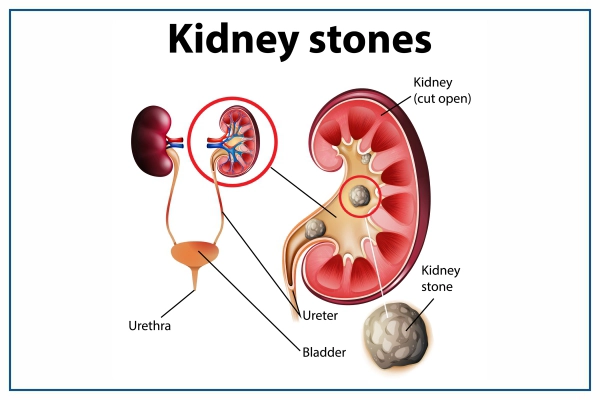Kidney stones, also known as renal calculi, are hard deposits made of minerals and salts that form inside the kidneys. These stones can cause significant pain and discomfort and, in severe cases, can lead to complications requiring medical intervention. Understanding the formation, types, symptoms, and treatment options for kidney stones is essential for prevention and management.

Formation of Kidney Stones
Kidney stones develop when there is a high concentration of certain substances in the urine, such as calcium, oxalate, and uric acid. Under normal conditions, these substances are diluted in the urine. However, when the urine becomes concentrated due to inadequate fluid intake or other factors, these substances can crystallize and stick together, forming stones. Several factors contribute to the formation of kidney stones:
- Dehydration: Insufficient water intake can lead to concentrated urine, increasing the likelihood of stone formation.
- Diet: Diets high in protein, sodium, and sugar can raise the risk of certain types of kidney stones. Excessive consumption of oxalate-rich foods like spinach, nuts, and chocolate can also contribute.
- Medical Conditions: Conditions such as hyperparathyroidism, urinary tract infections, and certain metabolic disorders can increase the risk of developing kidney stones.
- Genetics: A family history of kidney stones can predispose individuals to forming them.
- Medications: Some medications can increase the risk of stone formation by altering the balance of substances in the urine.
Types of Kidney Stones
There are several types of kidney stones, each with different causes and compositions:
- Calcium Stones: The most common type, typically composed of calcium oxalate or calcium phosphate. Factors such as high dietary calcium intake and certain genetic disorders can lead to their formation.
- Struvite Stones: Often form in response to a urinary tract infection. These stones can grow quickly and become quite large.
- Uric Acid Stones: Form when urine is too acidic. Diets high in purines (found in red meat, shellfish, and alcohol) can increase the risk of uric acid stones.
- Cystine Stones: Result from a genetic disorder called cystinuria, where the kidneys excrete too much of the amino acid cystine.
Symptoms and Diagnosis
Kidney stones may remain asymptomatic until they move within the kidney or pass into the ureter. Common symptoms include:
- Severe pain in the side and back, below the ribs
- Pain radiating to the lower abdomen and groin
- Pain during urination
- Pink, red, or brown urine
- Nausea and vomiting
- Frequent urge to urinate or urinating in small amounts
Diagnosis is typically made through imaging studies such as X-rays, CT scans, or ultrasounds. Urine and blood tests may also be conducted to identify contributing factors and prevent recurrence.
Treatment and Prevention
Treatment options vary based on the size and type of the stone:
- Small Stones: Often pass on their own with increased fluid intake and pain management. Medications may be prescribed to help relax the ureter and facilitate stone passage.
- Large Stones: May require more invasive treatments such as extracorporeal shock wave lithotripsy (ESWL), ureteroscopy, or percutaneous nephrolithotomy to break up or remove the stones.
Preventive measures include:
- Drinking plenty of water to dilute urine
- Reducing sodium and protein intake
- Limiting foods high in oxalates and purines
- Taking prescribed medications to control underlying medical conditions
Conclusion
Kidney stones are a common urological condition that can cause significant discomfort and complications if left untreated. Understanding the factors that contribute to their formation and adopting preventive measures can help reduce the risk. With appropriate medical intervention and lifestyle modifications, individuals can manage and prevent kidney stones effectively.
Comments
Post a Comment